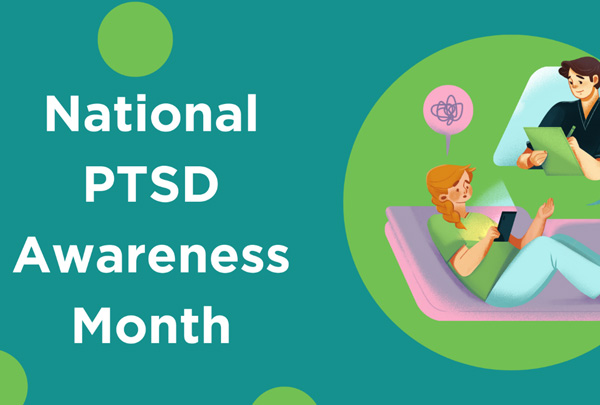PTSD Awareness Month: How CFI Supports Clients with Trauma
This past June, we recognized Post-Traumatic Stress Disorder (PTSD) Awareness Month — a time to raise awareness about the impact of trauma, and the importance of compassionate, evidence-based care. At Centers for Independence (CFI), we support clients facing PTSD and other co-occurring mental health conditions every day./p>
At least 90% of people served by CFI’s Whole Health Clinic live with PTSD. It’s extremely common for people to experience co-occurring diagnoses, as trauma is often the root cause of other mental health conditions. Even without a formal PTSD diagnosis, individuals may exhibit symptoms. This overlap makes diagnosis difficult — especially when trauma has not been disclosed. PTSD can lead to unhealthy coping strategies, such as substance use or self-harm, reinforcing the need for trauma-informed care as the foundation of effective treatment.
Providing Support for People Living with PTSD
People living with PTSD often have diverse trauma histories. Many have experienced childhood abuse, neglect, exposure to violence or medical trauma. It’s important to recognize that trauma is highly individualized, and people vary in their resilience and ability to process and recover from traumatic experiences. A PTSD diagnosis is not one-size-fits-all.
CFI offers a comprehensive range of services, including individual therapy, group therapy, case management and access to psychiatric prescribers. An on-site pharmacy makes access to medication easier for clients, and a 24-hour crisis line provides immediate support to those in distress. CFI also collaborates closely with Milwaukee County Community Access to Recovery Services (CARS), which has its own dedicated crisis response team to further assist clients in urgent situations.
A Focus on Client-Centered Care
As a client-centered agency, CFI emphasizes the importance of building trust and rapport. In case management, this process often begins with small steps, such as motivating clients to engage in goal setting or attending appointments. Outpatient therapy clients may progress more quickly, allowing for the use of specific therapeutic modalities like dialectical behavior therapy (DBT), which emphasizes the balance between acceptance and change. CFI team members take a holistic approach to care that addresses each client’s social, emotional, cultural and spiritual well-being.
The most important step to supporting someone with PTSD is building safety and trust. Licensed outpatient therapists at CFI conduct assessments and diagnoses, set treatment goals and provide psychoeducation. Case managers evaluate symptoms and assist with coordinating psychiatric appointments, often accompanying clients to offer additional support. Together, care teams collaborate to develop a treatment plan that addresses symptom management and promotes stabilization.
PTSD is more than just flashbacks and fear; it is a complex and highly individual diagnosis. Symptoms can be subtle and difficult to recognize, while at other times they may be very apparent. Reducing the stigma surrounding PTSD and mental health is important. With patience and the right support, people living with PTSD are fully capable of growth and healing.
You’re Not Alone – We’re Here to Help
Mental health can be complex, but you don’t have to navigate it alone. CFI’s Crisis Resource Centers are available 24/7, with a dedicated team ready to provide compassionate, trauma-informed care tailored to your needs. Whether you’re in crisis, starting your healing journey or helping a loved one find support, we’re here for you.
About CFI’s Behavioral Health Services
CFI provides comprehensive, person-centered mental health care for adults living with serious mental illness with an emphasis on treating the whole person. Our Whole Health Case Management program aims to improve individuals’ mental and physical well-being by building stability through therapy, psychiatry, case management and peer support. Through compassionate, trauma-informed care, clients are empowered to take control of their health, achieve personal goals and lead more fulfilling lives.
For more information, visit www.cfihope.org or call 414-937-2020.

